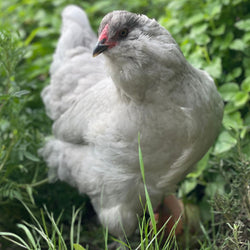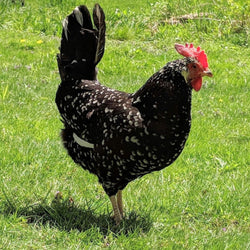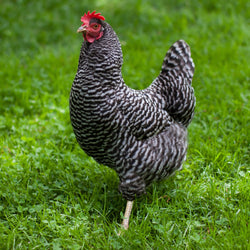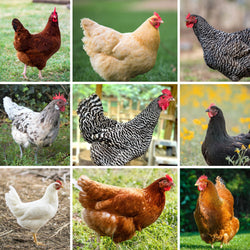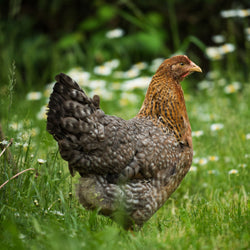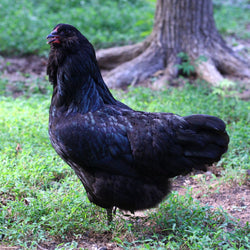page=53/--
Frequently Asked Questions
Here we answer the most commonly-asked questions about ordering, chicken care, and more.
What is a Livestock Guardian Dog (LGD)?
What is a Livestock Guardian Dog (LGD)?|Livestock Guardians are animals that protect livestock on the farm. They can be llamas or donkeys, but in most cases, they are dogs that have been specially bred over many generations with a focus on natural protective instincts coupled with low prey-drive. These dogs are known as Livestock Guardian Dogs, or LGDs for short. There are many different breeds of Livestock Guardian Dogs, but they all share some common traits: Large (usually) and have strong bite power to handle threats Trustworthy personalities and reliable behavior Generally low energy but capable of powerful bursts of...
Read MoreDo you ship to Canada?
We cannot ship any of our products to Canada, Mexico, or any other country. We also cannot ship to American territories, including Puerto Rico, American Samoa, Guam, the Marianas, or the Virgin Islands. That includes hatching eggs, day-old chicks, juveniles, waterfowl, and all non-live products as well. If you live in Canada, you might try Rochester Hatchery, which is located in Alberta.
Read MoreDo geese make good pets? Can't they be mean or aggressive?
You may be surprised to find that the answer to both questions is...yes! Geese can make great pets, and yes, they can sometimes be aggressive. Before that surprises you too much, think about "man's best friend": the dog. Sometimes dogs can be aggressive, right? In fact, one reason some people keep a dog is to provide protection to their family or belongings. In spite of the fact that they can be aggressive, dogs make excellent pets. The same is true with geese. Like dogs, they are very smart, can form tight bonds with humans, and can be aggressive in certain...
Read MoreHow can I handle an aggressive goose?
Geese can make great pets, and thankfully, most geese do not exhibit aggressive behavior. Among those that do, it is usually confined to the breeding and nesting season in spring and early summer. Geese are generally excellent parents, and like any good parent, want to protect their offspring from potential threats. Thankfully, whether during breeding season or not, with proper management strategies, you can help your geese be less aggressive and you can learn to handle more contentious individuals effectively. General strategies for handling geese First, never taunt or harass your geese, and do not allow children to do so,...
Read MoreHow do I pick up a goose?
In a word--carefully! Geese are very strong animals, and you will want to learn to catch and hold them properly to avoid getting pummeled by their wings, bitten, or scratched. It's also important that you pick them up properly to keep the bird from being injured as well. You'll want to avoid chasing geese over uneven, rocky, or otherwise dangerous terrain. Geese feet and legs can be injured, and you can be injured as well if you're not careful! Ideally, you will gently herd the goose into the corner of their pen or fence. You can use broom handles or...
Read MoreHow do I care for guinea keets?
For tick control and flock protection, there's nothing like guinea fowl! If you choose to raise guineas, the basic instructions for caring for baby chicks also apply to guinea keets, but there are a few special points of consideration that we will discuss below. You can see our basic chick care instructions here: Chicken Care Guide Chapter 4: Caring for Baby Chicks Shipped guinea keets will be 1-4 days old when they arrive, and they will need to be put in a pre-warmed brooder immediately, especially if they are showing signs of stress from shipping (like looking tired and weak)....
Read MoreWhat are the best ways to prevent impacted crop, impacted gizzard, and sour crop in my chickens?
Impacted crop occurs when there is a blockage in your chicken's digestive tract, preventing food from traversing her system. Occasionally you may actually have a blockage further down, like an impacted gizzard. Sour crop---a bacterial overgrowth in her crop, typically an overgrowth of yeast---can occur when the digestive system is stalled with an impaction, but can also happen on its own if there's a pH imbalance, or if your chicken is eating rotten or moldy food. There are a few good strategies you can use to prevent impacted crop and sour crop in your flock. Feeding Feed fresh, good quality...
Read MoreWhat is vent gleet and how can I treat my chickens that have it?
In baby chicks, pasty butt (a.k.a. pasted vent) occurs when poo dries in the chick's vent (her pooper) and the blockage prevents her from defecating. This is a critical situation for a baby chick and should be addressed immediately because it can be fatal. By the time your bird is an adult layer, her muscles are pretty well developed for expulsion, and the vent can expand significantly (large enough to pass an egg, right?). So, adult hens seldom (perhaps never!) suffer from pasty butt. That said, they can certainly get vent feathers messy with loose poo, and that can...
Read More







"The Clubhouse" Coop
Easy to assemble and built to last, the Clubhouse Coop is the perfect starter coop for a small flock.


